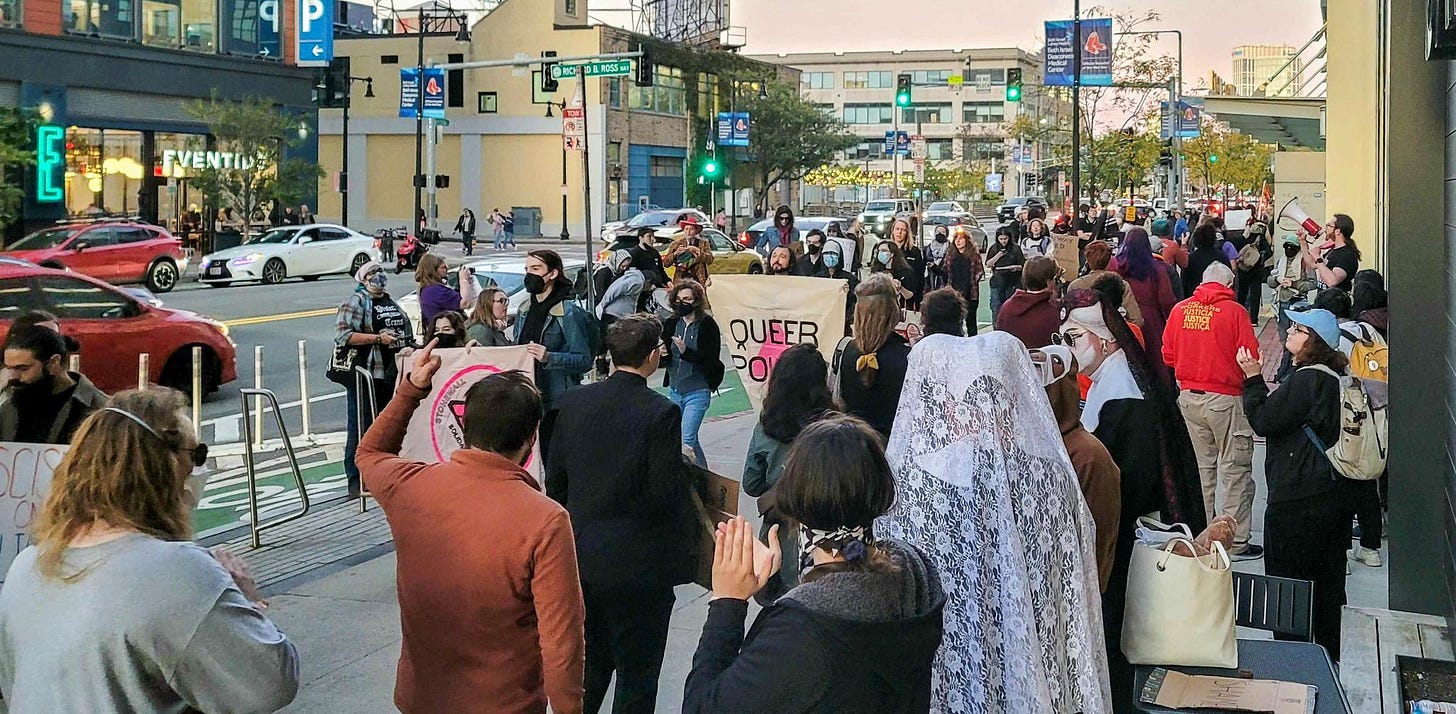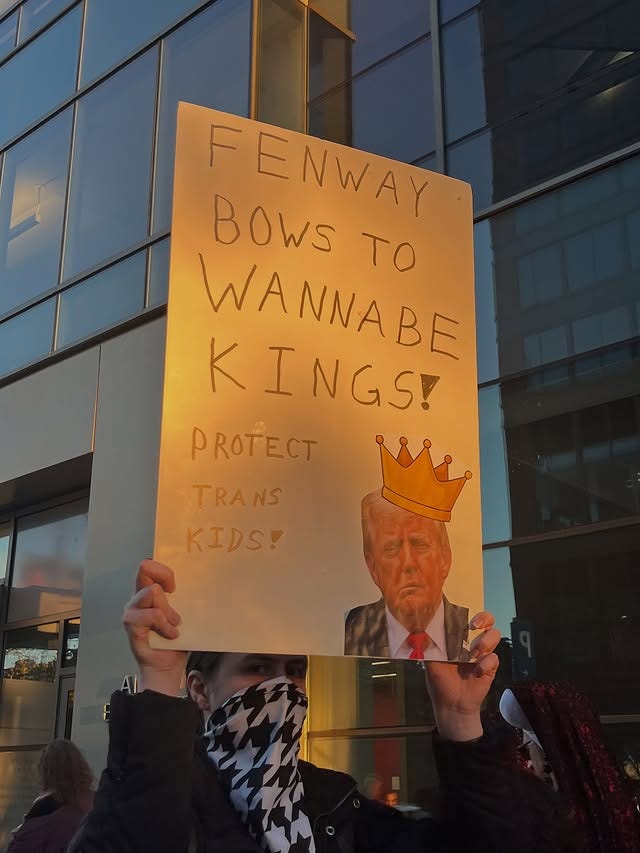After Fenway Cuts Trans Care, Protests Erupt—Again and Again and Again
“This failure of courage does not have to be permanent.”
Hundreds of protesters, from decades-old activist groups to autonomous cohorts of young people, have taken to the streets outside Fenway Health in Boston to protest the historic LGBT clinic’s capitulation to Trump’s anti-trans agenda.
Last week, Fenway announced it would stop providing puberty blockers and hormone therapies to trans people under the age of 19. The clinic—which was founded for the explicit purpose of providing care to underserved populations, namely poor people, people of color, and especially the LGBTQ community—asserted that the precarity of its mission, clientele, and federal funding necessitated the move in order to keep its doors open.
But trans people, providers, and parents have rejected this categorization. Activists labelled the care stoppage calling it a capitulation to a regime that won’t be satiated until all kinds of gender-affirming care, for trans people of all ages, is eradicated.
So the community staged a picket Friday, marched Monday, and pledged to be back again next week, too.
“We are calling on Fenway to find brave and creative solutions to maintain funding while following their mission to provide the same rights to every patient,” said Teddy Walker, a 20-year-old Boston student, reading from a statement penned alongside 21-year-old Berry Andres, their co-organizer for Monday’s action. Both are Fenway patients who started hormone therapy as teens—the very care and demographic being cut off now. So they know intimately how vital this life-saving care is for trans young people.
“This failure of courage does not have to be permanent,” Walker told Erin in the Morning. “We can still be allies in this historic fight together, because we know Fenway Health is not our enemy. The Trump Administration is. But that does not mean we will stand idly by as Fenway does Trump’s work for him by stripping patients of their care.”
An estimated 200 people heeded the initial call for a rapid response from ACT UP Boston, the local chapter of a direct action group founded in the 1980s in response to the HIV/AIDs crisis. The Sisters of Perpetual Indulgence, a protest drag organization, joined in and announced they would be boycotting Fenway’s annual gala on Nov. 14. After Andres and Walker put out a call for further action on social media, dozens more came out to support the cause on Monday, including the communications director for president of the Boston City Council.
According to Gerry Scoppettuolo, an ACT UP veteran, Andres and Walker aren’t the only ones taking matters into their own hands.
“The community has decided just to rise up,” Scoppettuolo told Erin in the Morning. He said he made a few calls ahead of Friday to get boots on the ground—but says even he didn’t know what would happen next.
“I just lit a match, but I was astonished at the size,” he said. “I got there at 4 o’clock when it was supposed to begin, and already, like 50 people were there.”
An estimated 200 people showed up that day alone, one protester told Erin in the Morning.
“I had to leave at six and they stayed for at least another half hour,” Scoppettuolo said. “The line was a block long. It was fucking incredible.”
Video from Friday shows just a portion of the demonstrators. Signs read: “Fascism feeds on compliance” and “How many have to die?.” One image showed a pastor carrying a sign reading: “Fenway Health: Denying trans kids care is just a phase that you can grow out of!”
Meanwhile, Andres and Walker told Erin in the Morning that people came out from the Fenway building to show their support. Several people showed up to Fenway for a flu shot, unaware of the care stoppage—and ended up joining the protestors, they said.
Inside Fenway, similar revolts are happening, according to Sky—a Fenway employee, who spoke to Erin in the Morning on the condition that a pseudonym be used, citing likely retaliation from their employer if they went on the record.
Sky said around 150 staffers attended a virtual meeting with Fenway executives last week, called after they announced the withdrawal of care. The Trump regime’s attacks on trans youth have been on the horizon for at least the last year now, but Fenway’s apparently sudden capitulation blindsided providers.
“They’ve been assuring staff at Fenway that there was a plan for this, that they were going to have a buffer,” Sky said, emphasizing that most providers wanted Fenway to fight back. “But they immediately sold out the kids.”
CEO Jordina Shanks was flooded with questions during the all-staff meeting, Sky said, but fell short of giving meaningful answers. Executives said it was a board decision. They said they had no choice. “There’s nothing left to say,” Shanks allegedly said, before attempting to leave the call early, as Fenway employees demanded answers.
Fenway and institutions like it are indeed facing frightening attacks from the federal government. “The US Department of Health and Human Services (HHS) recently issued a revised Grants Policy Statement which allows it to terminate a grant ‘for convenience’ if it ‘no longer effectuates the program goals or agency priorities,’” a Tuesday press release from Fenway said. “If we continued the service, our status as a Federally Qualified Health Center (FQHC) would have been at serious risk. Maintaining this designation is essential to our ability to continue providing high-quality, affordable care to more than 30,000 people across New England and beyond.”
“I get that from a Machiavellian, utilitarian sense of: ‘If we just cut out this vulnerable population, we can still continue to do good work on that one,’” Sky admitted. In addition to providing gender-affirming care, Fenway houses primary care physicians, a pharmacy, a behavioral health clinic, a dental practice, reproductive health services, and more.
But Fenway Health has not publicly released any information about explicit threats from the government challenging its FQHC status. It also did not respond to a request for comment for this piece. And updates to the Grants Policy Statement do not inherently amount to a change in regulation, attorney Alejandra Caraballo told Erin in the Morning, meaning it is not ironclad.
“It’s flawed thinking because that’s not what’s going to happen,” Sky said. “Every institution that has caved to Trump so far has come back to get shaken down again. It’s only the ones who stood up, and said no, and have gone to court, that have had any degree of success against this.”
The nearby Boston Children’s Hospital refused to comply with an arguably unlawful subpoena of their staff and patients, and they refused to bow to Trump’s anti-trans executive orders, which do not hold the weight of law—despite the White House’s attempts to craft the narrative otherwise. Meanwhile, Massachusetts state law and its constitution have been interpreted to protect trans people from discrimination, and restricting trans people’s access to care arguably violates such laws.
Andres and Walker said they will be back at Fenway on Saturday, Nov. 1—this time, they are planning to partner with even more local groups. Their Instagram page—Hold Fenway Health Accountable—will continue to post updates about upcoming demonstrations, they said.
“Our ask for Fenway is to leverage their partners and not compromise their mission: to provide equitable and equal care to every person, and to sustain their programming as a clinic that serves a lot of low income people,” they said. “We don’t believe it has to be an either or.”





Protests certainly help, but what would be the most effective approach here would be if the state’s AG can get involved and make the determination whether Fenway Health’s actions violate the state’s protective laws - and if they do, then holding them responsible. Also, can the state offer to make up the federal funding that Fenway Health is fearing that it will lose?
This is where grassroots pediatricians who don’t rely on federal funding need to pick up after the failures of these institutions bowing to a corrupt, hate-filled administration and start providing the care these kids need!